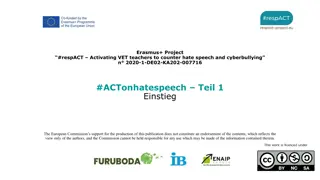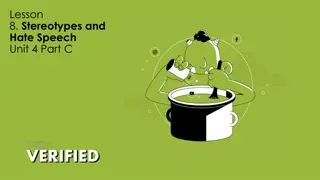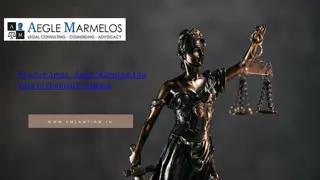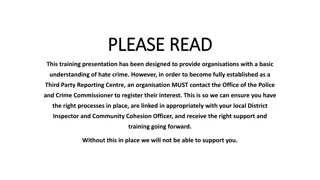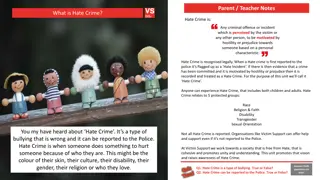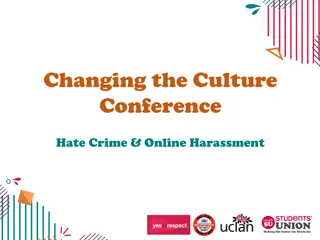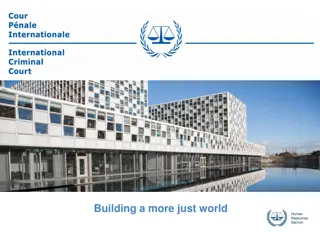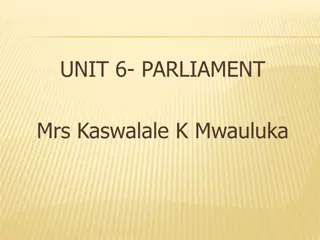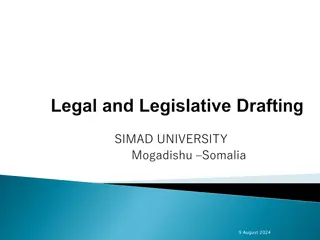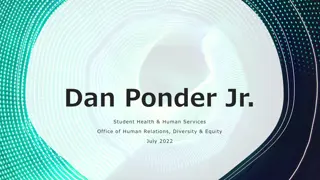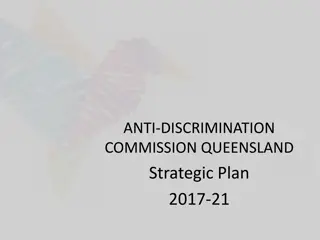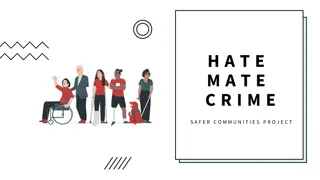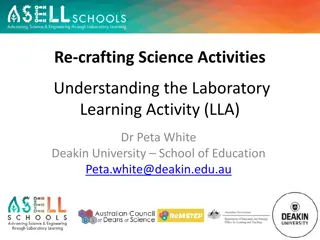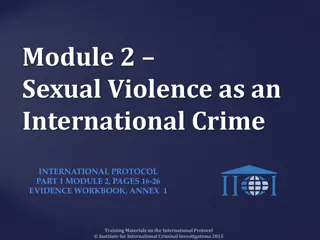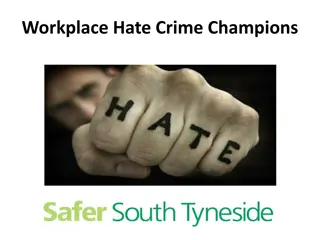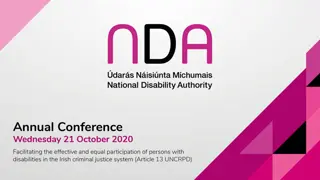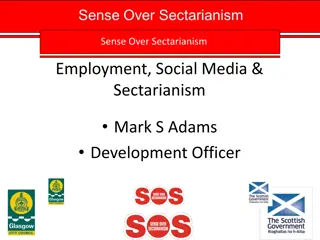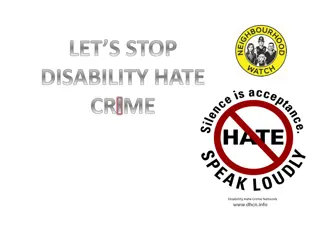Understanding the Queensland Parliament's Inquiry on Vilification and Hate Crimes
The Queensland Parliament's Legal Affairs & Safety Committee is leading an inquiry to investigate hate crimes and vilification in Queensland, examining the effectiveness of current laws and encouraging submissions and stories to help address these issues. The inquiry was prompted by the rise in public acts of vilification, particularly following events like the Christchurch massacre and COVID-19 related racial attacks. Stakeholders are urged to participate in shaping stronger legal protections.
Download Presentation

Please find below an Image/Link to download the presentation.
The content on the website is provided AS IS for your information and personal use only. It may not be sold, licensed, or shared on other websites without obtaining consent from the author. Download presentation by click this link. If you encounter any issues during the download, it is possible that the publisher has removed the file from their server.
E N D
Presentation Transcript
Vilification and hate crimes: About the Queensland Parliament s inquiry
Please note This presentation includes real stories of vilification. These stories might make some people feel uncomfortable or upset, but they are important for helping us all understand what vilification is, and what type of stories the inquiry Committee needs to hear. If any content makes you feel upset please let the facilitator or someone else know, and do whatever you need to do to look after yourself. 2
Today we will talk about What is the inquiry, and why is it happening? What is vilification? Who is protected by the law now, and who else could be protected? Why is it important to tell your story to the inquiry Committee? Questions for you to think about. How can you be involved or make a submission?
What is the inquiry? Queensland Parliament s Legal Affairs & Safety Committee will lead the inquiry. The Committee will inquire (find out) about: the type and amount of hate crime and serious vilification in Queensland; if hate crime and vilification in Queensland is increasing; the effectiveness of Queensland laws in dealing with hate crime and vilification.
What is the inquiry? People & organisations can tell the Committee what they think about: hate crime and vilification in Queensland; how effective Queensland laws are for protecting people from hate crime and vilification. People & organisations can do this by: submissions in writing or video (by 12 July 2021); and telling their stories at confidential hearings; and attending community forums.
Why is the inquiry happening? Many people in Queensland have experienced public acts of vilification because of their race, religion, sexuality or gender identity. 2019 Christchurch massacre and the increase of public racial attacks in Australia due to COVID-19 led to increased attention on vilification. Low levels of reporting of vilification and hate crime in Queensland. This is because the existing laws are not strong enough.
Why is the inquiry happening? In 2020 an advisory group (Cohesive Communities Coalition) worked with Queensland Human Rights Commission on how to strengthen legal protections. The Coalition identified these problems with Queensland laws: Low reporting of vilification and hate crimes; victim vulnerability; not enough information on racially motivated crimes. Existing vilification offence is not being used by Queensland Police. Distribution and display of hateful material (including symbols like the Nazi Flag) is not a criminal offence in Queensland. The Coalition sent a proposal to the Qld government.
What is vilification? Vilification is unlawful in Queensland. Vilification is public behaviour that can encourage other people to have hatred, serious contempt for, or severe ridicule of people or groups of people because of their: race sexuality gender identity religion
What is serious vilification? When vilification includes: a threat of physical harm towards a person or group of people, or their property; or encourages other people to threaten physical harm; this is called serious vilification . It is a crime in Queensland. Maximum penalty of $9341.50 fine or 6 months in prison.
Example of racial vilification (Sunshine Coast 2020) An international student from Nepal was waiting for a bus at a bus station. A group of people approached him and asked him: Do you have a bomb in your bag? Then one of them asked: Are you going to blow us all up? Other people waiting for the bus could hear this, and the student felt very uncomfortable, and embarrassed. He just smiled at the group, because he didn t want any trouble.
Example of sexuality vilification (Cooloola Shire 2008) A local government councillor on the Cooloola Shire Council was seen driving a car that had a bumper sticker that said: Gay rights? Under God's law the only rights gays have is the right to die The councillor also wrote a report and tabled it at a council meeting. The report referred to homosexuals as sodomites, saying they prey on children and should not be allowed anywhere near schools , etc. 11
Example of serious vilification (Brisbane, 2020) A woman was entering her apartment building. Another resident pushedherout, and told her that she was not allowed to enter the building unless she was quarantined and cleared of the coronavirus. She told him that she didn t have the virus. The other resident replied: all Asians have it because of your disgusting eating habits.
Example of serious vilification (Brisbane, 2014) A woman was walking down the main street in West End. A man leaned out of a pub window and tried to light her hijab with his cigarette lighter. The man was fined $500 for the unprovoked attack.
Example of serious vilification (Brisbane, 2019) Graffiti on Holland Park Mosque: REMOVE KEBAB , ST. TARRANT with a Nazi symbol
Who is protected by the law now? People identified by their race: their ethnic background, nationality, culture, or skin colour. People identified by their religion; People identified by their sexuality: whether they are heterosexual, homosexual, or bisexual; and People identified by their gender identity: who identify as the opposite sex to which they were assigned at birth, or when an intersex person identifies as a member of a particular sex.
Who could be protected by the law in the future? The Committee might consider adding other groups to the list of groups that are protected under the law now, for example: Disability; includes many types of disability, whether physical, psychiatric, or sensory (like sight or hearing), or other illnesses such as epilepsy, autism, hepatitis or HIV. Sex; whether someone is male or female or other.
Its important to tell the Committee your story Community organisations have told Parliament that Queensland laws are not strong enough. The Committee also needs to hear from people who have experienced vilification, so they understand how it affects them. This will help them understand how often it happens, why people do not report, or if they were unhappy with the result when they did. Telling your story will help the Committee think about what Queensland could do to make sure vilification happens less.
Questions for you to think about: personal What happened to you or someone you know? When, where, what happened? How did you feel at the time, and afterwards? Did you try to do something about it using the existing system? For example, did you report to the police or other organisation?
Questions for you to think about: personal If you did report it, did you get results that you were happy with, or a result that you were not happy with? If you did not get good results, how would you like the existing system to improve for you? If you didn t report it what do you think is wrong with the existing system, and why didn t you use it?
Questions for you to think about: general Do you think there should be stronger criminal laws about vilification and hate crime? If so, what? How do you think laws should deal with online vilification and hate crime? What do you think would help fight against vilification and hate crime? Do you think other people should be protected from vilification and hate crime under the law? If so, on what grounds (e.g. because of disability, sex, age, etc.)?
How can you make a submission? There are two ways you can tell your story to the Committee: Make a written submission Make a video submission The deadline is 12 noon on Monday 12 July 2021. To make a submission, use the templates in the Consultation Kit. If you are representing the opinions and experiences of an organisation, use the template for organisations; If you want to tell your personal story, or give your own opinion, use the template for individuals.
How can you make a submission? Email: Post: lasc@parliament.qld.gov.au Legal Affairs and Safety Committee Parliament House George Street BRISBANE QLD 4000
Guidelines for a written submission There is no specific format for submissions, but parliamentary guidelines say that Committees prefer submissions that: Are typed (Word or PDF documents) Can also be neatly handwritten with numbered pages Have a clear structure, and are concise and accurate Include evidence to support your opinions or recommendations if you re making any.
Guidelines for audio or video submissions There is no specific format for audio or video submissions, but: Files larger than 50MB must be mailed to the Committee on USB. You can reduce your file size by keeping your video short, changing the video settings in your phone from UHD or FHD to HD, or by reducing your file size before you click send on your email. Committee will hold a video submission session in early July at Parliament House contact the secretariat on 07 3553 6641 to find out more.
Confidential submissions Submissions are usually published. Anonymous submissions are not allowed but you can request for your submission to be kept confidential. You can choose whether you would like just your name to be kept secret (but the rest of your submission published), or your entire submission. If your entire submission is kept confidential, only the Committee and their staff will see it. Include your request when you lodge your submission. Make sure you specify whether it is your name or your entire submission you would like kept confidential.
How can you be involved in other ways? You might be able to speak directly to the Committee. The Committee will hold public hearings where people and organisations who made submissions can tell their story and answer questions (face to face, or by phone). This Committee will decide who will tell their story at the hearings, and where the hearings will be. This will happen after the submissions close on 12 July 2021. You can contact the Committee secretariat on 07 3553 6641.
Thank you for participating. For more information on the inquiry or on vilification law, visit the Queensland Human Rights Commission website: www.qhrc.qld.gov.au/law-reform
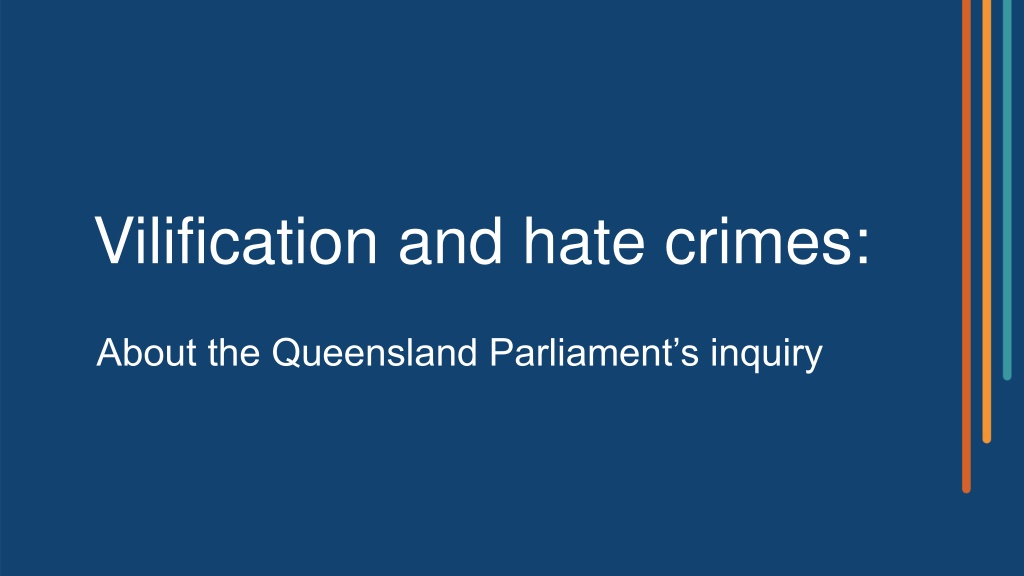

![Prevention and Combating of Hate Crimes and Hate Speech Bill [B.9B.2018]](/thumb/60513/prevention-and-combating-of-hate-crimes-and-hate-speech-bill-b-9b-2018.jpg)
